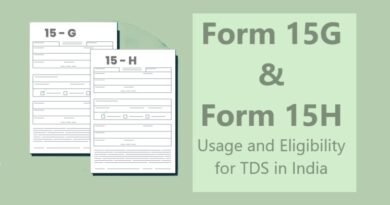
Section 194H of the Income Tax Act
Introduction
Section 194H of the Income Tax Act, 1961, is an important provision concerning the deduction of tax at source (TDS) on commission or brokerage payments. Introduced to ensure tax compliance and transparency in financial transactions, this section mandates that a person paying commission or brokerage must deduct a specified percentage as TDS before making the payment. This article provides a comprehensive overview of Section 194H, covering its scope, applicability, exemptions, and implications.
What is Section 194H?
Section 194H governs the deduction of tax on any income by way of commission or brokerage paid to a resident individual. This provision is applicable when such payments exceed a specified monetary threshold within a financial year. The primary objective of this section is to bring transparency to commission-related transactions and prevent tax evasion.
Key Provisions of Section 194H
- Applicability:
- Section 194H applies to payments categorized as commission or brokerage exceeding ₹15,000 in a financial year.
- The payment must be made to a resident individual, Hindu Undivided Family (HUF), firm, or company.
- Definition of Commission or Brokerage:
- The term “commission or brokerage” refers to any payment received or receivable, directly or indirectly, for services rendered or for any transaction relating to the sale or purchase of goods, or in connection with any asset, valuable article, or thing.
- It does not include commission on insurance premiums, which are covered under a different provision.
- Rate of TDS:
- The rate of TDS under Section 194H is 5%.
- No surcharge or cess is applicable on this deduction.
- Threshold Limit:
- TDS is required only if the total commission or brokerage paid during the financial year exceeds ₹15,000.
- Time of Deduction:
- The tax must be deducted at the time of crediting the payment to the payee’s account or at the time of actual payment, whichever is earlier.
Exemptions under Section 194H
Certain payments are exempt from TDS under Section 194H:
- Personal Payments:
- Payments made by individuals or HUFs for personal purposes are exempt from TDS under this section.
- Payment by Non-Individuals not in Business:
- If the payer is not carrying on business or does not exceed the monetary threshold for tax audit under Section 44AB, TDS under Section 194H is not applicable.
- Exempt Transactions:
- Payments that do not qualify as commission or brokerage, such as discounts offered directly to customers or trade incentives not involving intermediaries, are outside the purview of Section 194H.
Compliance Requirements
To comply with Section 194H, the following steps must be adhered to:
- TAN Registration:
- The payer must have a Tax Deduction and Collection Account Number (TAN) to deduct and deposit TDS.
- Deposit of TDS:
- The deducted TDS must be deposited with the government within the specified time frame using the prescribed challan (Challan ITNS 281).
- Filing of TDS Returns:
- The payer must file quarterly TDS returns (Form 26Q) detailing the deductions made under Section 194H.
- Issuance of TDS Certificate:
- A TDS certificate (Form 16A) must be issued to the payee, providing details of the tax deducted and deposited.
Consequences of Non-Compliance
Failure to comply with Section 194H can lead to significant penalties and consequences:
- Disallowance of Expenditure:
- If TDS is not deducted or deposited as required, the commission or brokerage expense may be disallowed as a deduction under Section 40(a)(ia) of the Income Tax Act.
- Interest on Late Payment:
- Interest at the rate of 1% per month (or part thereof) is charged for non-deduction of TDS.
- Interest at the rate of 1.5% per month (or part thereof) is charged for late deposit of TDS.
- Penalties:
- Penalty under Section 271C may be levied for failure to deduct tax.
- A penalty of ₹10,000 may be imposed for not obtaining a TAN.
Practical Implications
Section 194H has wide-ranging implications for businesses and individuals involved in transactions that involve commission or brokerage payments. Compliance ensures:
- Transparency:
- Reduces the risk of disputes and audits by the Income Tax Department.
- Tax Planning:
- Proper accounting and deduction of TDS help in accurate tax planning and filing.
- Avoidance of Penalties:
- Ensures that businesses avoid financial and legal penalties associated with non-compliance.
Recent Developments
In recent years, there has been an increased emphasis on digitization and reporting to improve compliance with TDS provisions, including Section 194H. Enhanced scrutiny and penalties highlight the importance of adhering to the guidelines under this section.
Conclusion
Section 194H of the Income Tax Act plays a crucial role in ensuring tax compliance in transactions involving commission or brokerage payments. By mandating TDS on such payments, it fosters transparency and prevents tax evasion. Adhering to the provisions of Section 194H is essential for businesses and individuals to avoid penalties and maintain smooth financial operations. With proper compliance, Section 194H becomes a robust tool for equitable tax collection and financial discipline.






